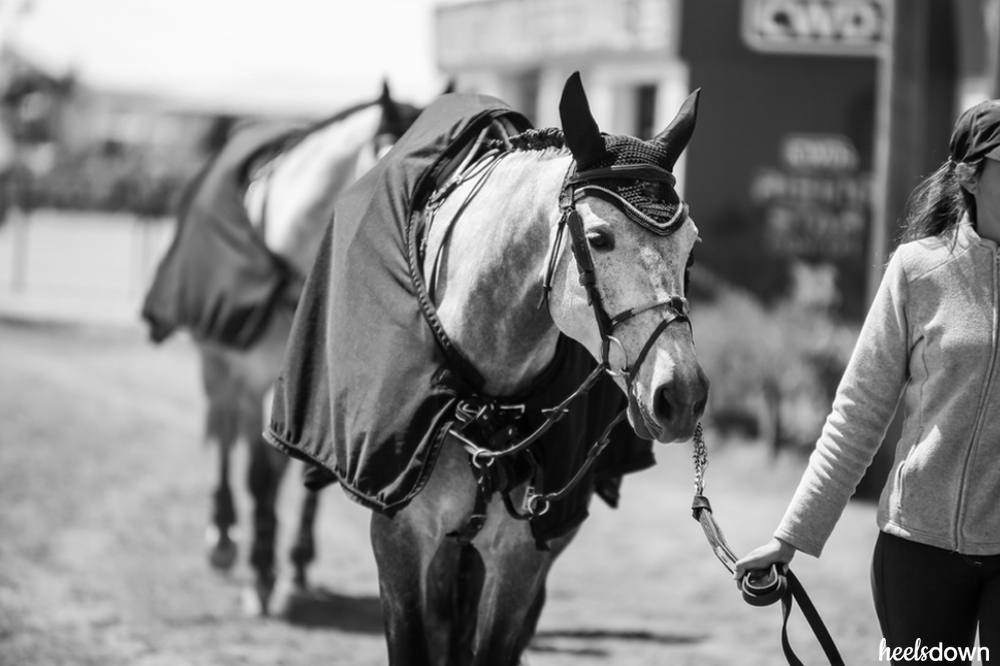Working Conditions For Grooms Need To Change Now

Editor’s Note: Heels Down Mag asked adult amateur riders to tell us how they would change equestrian sport. Our editorial team selected five finalists’ essays, which are being published this month. One winner will receive an Ecogold Secure saddle pad of their choice ($170-250 value).
By Savannah Tjelmeland
Living in Central Maine with limited funds for horses, the A Circuit was way out of my stratosphere. I followed some girls on Instagram that had my “dream life.” They showed at WEF, had gorgeous horses, wore the nicest clothes and just seemed like they had life figured out. I wanted it. One day a Johnson and Wales University brochure came in the mail highlighting their Equine Business Management degree. The universe had just given me the answer I was looking for – Go to college for horses. Boom! Done.
In the words of Hannah Montana, it was the best of both worlds. I would go to JWU, learn to be an incredible rider, get hired to work for a top professional and travel around the world riding horses. I’m sure my story is similar to so many of you out there because the girls I went to school with certainly had similar dreams. Unfortunately, many of us go to college for horses and then go out into the industry and our dreams are promptly killed.
I would like to see the horse industry fight for the rights of the people who work in it. The whole “do what you love and never work a day in your life” theory is, for lack of a better word, total horse crap. People who work in this industry work their butts off everyday. Working with horses is very physical and there is a stigma that just because you love horses, you should work and care for them from 4 a.m. to 9 p.m. and you should never sit down and never take a break. Holding a horse at the ring and eating a bagel is the closest thing to a break most grooms get, and trust me, their feet are killing them.
Running on a show schedule, I understand how those hours are necessary, but normal employees would be compensated for working overtime. The salary should reflect the average amount of hours one would spend doing the job and be compensated accurately. Please don’t get me wrong, I am all for giving horses proper care and management, but I am also a huge believer in treating your employees like human beings. Working hard is a huge lesson horses teach us all from a young age, but where do you draw the line between working hard and burning yourself out?
Every experience I’ve had working in the industry has left me with a bad taste in my mouth. I’ve left horse shows hoping to never see a horse again and it’s the most devastating feeling. There is something to be said for putting in the time and working your way up, but that doesn’t mean you shouldn’t be valued and treated fairly on the way.
Many people say that to work in the horse industry you don’t need a degree, you just need experience. I can agree with that to a point, but I think that is where the problems of the industry stem from. Experience can be good or bad depending on who someone works for. Opinions and facts are almost interchangeable unless the person has done their own research into the matter. Even then it is difficult to question your boss’s decisions because it’s ultimately their choice on what happens to their horses, whether you agree with it or not. Lack of proper education can lead to dangerous and sometimes unethical situations.
Places like Massachusetts require all instructors to be licensed with the state and pass an exam demonstrating their knowledge before sending them out into the industry. I wish more states required that. People go to college and rack up huge student debt and then find a job in the horse industry just to get paid give-or-take $100 a day for doing 10-plus hours of manual labor from people who may or may not have as much education as them. There are also problems with barns and facilities hiring people with no contracts, so when employees ask about the benefits they were supposed to be receiving there is nothing to hold the employer accountable.
There are so many people who just want a job with horses and they are willing to do the long hours and back breaking work, that when people start asking to be paid what they are worth they get pushed to the side because the employer can find someone else to work in rough conditions, but why should they have to!? I believe the horse industry is in need of a union. If colleges are going to offer degrees such as equine business management, then the industry should have regulations on how to treat their qualified employees and a committee that follows up with the employers.
I left my dream college and all my friends because I realized, after working a total of seven days at the Saratoga Horse Show, that an equine business management degree was not going to give me the life I wanted. There is no limit to the amount you work, and even if you work from 5 a.m. to 8 p.m. you still only get paid whatever you agreed upon to be your daily salary. Your life and time is not your own. Sometimes you get tips, but not all the time.
I decided I would get a degree in a field that would get me a good paying job so I could afford to have my own horse and live it up as an adult amateur. Truthfully, I am still unhappy because I now know more about horse care than most of the people who own boarding facilities.


